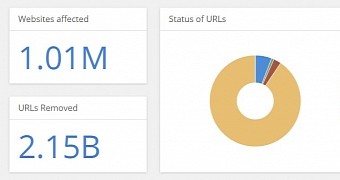Google is putting in a lot of work to help out copyright holders only for it to be a waste of time. According to the company, 99.95% of the URLs it was asked to take down last month didn't even exist in its search indexes.
The comment was made in a submission sent to the U.S. Copyright Office, where Google has given the DMCA a vote of support, despite all the wasted time and effort put in to deal with this situation, Torrent Freak points out.
Google, given its position as the most used search engine in the world, has put in a lot of effort over the past few years to remove URLs infringing on copyright. The company has removed over 2.15 billion URLs since 2011, according to its Transparency Report. The number was rather small in the beginning, but it has grown exponentially in the past few years, so much that in the past year alone it has removed over 917 million URLs, affecting over 357,000 websites.
The company has no obligation to be the police when it comes to websites infringing on copyright, but it is expected to remove the links when it is requested to do so. Google has been the good guy so far, complying every time if they thought the demand was justified. To waste the company's time out of incompetence or ill-will, however, is not a nice thing to do.
Currently, rightsholders are complaining that the Digital Millenium Copyright Act is failing them, so the details are currently under investigation by the U.S. Copyright Office to see if there's anything to be done.
Google thinks DMCA system works just fine
Unlike copyright holders, Google believes the DMCA is doing just fine. "The DMCA has proven successful at fostering ongoing collaboration between rightsholders and online service providers, a collaboration that continues to pay dividends both in the U.S. and in international contexts," Google writes on the topic.
The company has added that its YouTube Content ID is one of the collaborations between service providers and rightsholders, and the system has helped creators take down or monetize infringing content, depending on what they decided to do.
"Google has provided new incentives to make heavy use of the DMCA takedown system. We now use the number of valid DMCA requests a domain has received as one of the inputs in making ranking determinations in search results, so rightsholders seeking to take advantage of this signal have further incentive to file notices," Google notes.
While this is all great, Google has some complaints of its own. A major peeve of the company is the fact that a substantial number of takedown requests submitted to Google are for URLs that have never been in their search index, and therefore could never have appeared in the search results.
"In January 2017, the most prolific submitter submitted notices that Google honored for 16,457,433 URLs. But on further inspection, 16,450,129 (99,97%) of those URLs were not in our search index in the first place," Google notes.
This can be categorized as straight-out abuse. But this isn't really a surprise. Just a few days ago a report indicated that the most targeted website by DMCAs was one that barely gets any traffic. In fact, Google is currently asked to take down 51.2 million URLs coming from mp3toys.xyz, a site that no one knows about.
A new move to tackle DMCAs
Google is trying to be a good sport here and announced that it was going to accept takedown notices for URLs that don't exist, to make sure they are blacklisted and never appear in future search results.
Where this new decision will take remains to be seen, but Google seems to have a pretty good reason to back it up. The company said that, out of the 35 million URLs processed in the second half of September 2016 that were not in the index, less than 2% would have made it into the index in the four months that followed. "Notices for the other 98%, therefore, were at best unnecessary," Google writes.
Even with this knowledge, chances are rightsholders won't back down and will start sending Google even more takedown requests.
For its part, Google seems to be quite comfortable with the system it set up to handle DMCAs, even with the growing workload.

 14 DAY TRIAL //
14 DAY TRIAL //